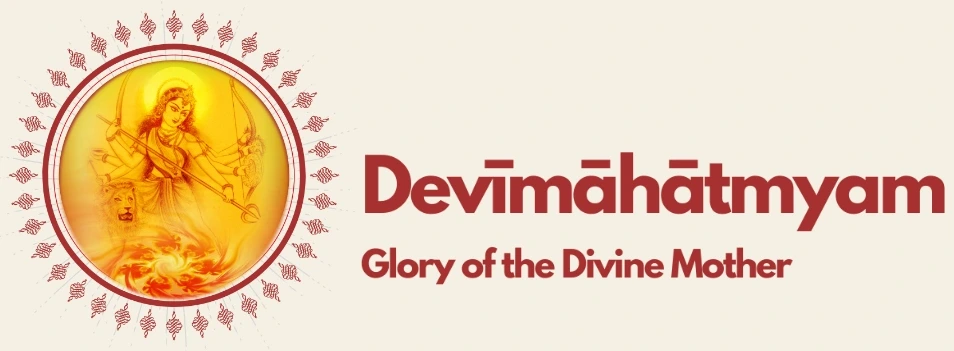Devimahatmyam
या देवी सर्वभूतेषु चेतनेत्यभिधीयते।
नमस्तस्यै नमस्तस्यै नमस्तस्यै नमो नमः॥
To the Goddess who in all beings is called consciousness, to her salutations,
to her salutations, to her salutations, salutations, salutations.
(Devī Māhātmyam)
Devī Māhātmya, commonly referred to as Śrī Durgā Saptaśati, is a revered scripture from the Mārkaṇḍeya Purāṇa that celebrates the triumph of Goddess Durgā over evil forces such as Mahiṣāsura. Emphasizing the importance of the Mārkaṇḍeya Purāṇa, Sri Aurobindo remarked, “….মার্কণ্ডেয় পুরাণের মত পণ্ডিত অধ্যাত্মবিদ্যাপরায়ণ লেখকের রচনাকে শিব বা অগ্নিপুরাণ অপেক্ষা গভীর জ্ঞানপূর্ণ বলিয়া চিনিতে হয় ।” (“….the Markandeya Purana written by a sage devoted to spiritual pursuits is more profound in Knowledge than either the Shiva or the Agni Purana.”) Sri Aurobindo has specifically mentioned the four powers of the Mother as Māheśvarī, Mahākālī, Mahāsarasvatī, and Mahālakṣmī. This scripture symbolizes the victory of divine feminine energy (Śakti), promotes courage, and highlights themes of protection, prosperity, and spiritual advancement, inspiring devotees through their faith, strength, and ethical values.
Markandeya Rishi is a distinguished sage celebrated for his unwavering devotion and immortality. He was born to Mrikandu Rishi and Marudvati, with a fated demise set for the age of sixteen. As this fateful hour approached, he sought solace in deep worship of Lord Shiva, embracing the Shivalinga. When Yama, the god of death, endeavored to claim him, Shiva intervened and struck Yama, granting Markandeya eternal life. Thereafter, he became the seer of the Markandeya Purana and the revered Devi Mahatmya (Durga Saptashati). Furthermore, he witnessed the divine sight of the infant Vishnu resting on a banyan leaf during the cosmic dissolution. Markandeya exemplifies the victory of devotion over destiny.
Devī Māhātmya is a highly esteemed text found within the Mārkaṇḍeya Purāṇa. Sri Aurobindo has noted that “….the Chandi-Mahatmya, deservedly one of the best known in sacred literature;..” During the Navaratri festival, the Devī Māhātmya is recited throughout various regions of India, signifying a major celebration of Goddess Durgā as the Divine Śakti.
Devī Māhātmya is divided by three episodes followed by thirteen chapters:
The First Episode- Meditation on Mahākālī
First Chapter- Slaying of Madhu and Kaiṭabha
The Second Episode-Meditation on Mahālakṣmī
Second Chapter- Slaughter of the Armies of Mahiṣāsura
Third Chapter- - Slaying of Mahiṣāsura
Fourth Chapter- Devī Stuti
The Third Episode- Meditation on Mahāsarasvatī
Fifth Chapter- Devī’s conversation with the Messenger
Sixth Chapter- Slaying of Dhumralocana
Seventh Chapter- Slaying of Caṇḍa and Muṇḍa
Eighth Chapter- Slaying of Raktabīja
Ninth Chapter- -Slaying of Niśmbha
Tenth Chapter- Slaying of Śumbha
Eleventh Chapter- Eulogy of Merits
Twelfth Chapter- Bestowing of Boons to Suratha and Vaiśya
Thirteenth Chapter- The Goddess’s Grace
The text is also chanted with Devī Sūktam, The Triple Secret, i.e. Prādhānika Rahasya
Vaikṛtika Rahasya, Mūrti Rahasya, Kṣamā Prārthanā and Prayoga

